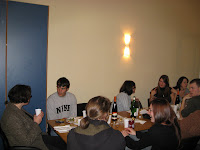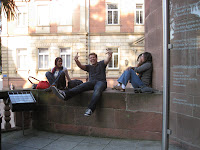Today is the third day of classes; I did not get to write yesterday because I was up until well after 11pm doing homework and laundry. Tonight the work load is a bit less, so I have a few minutes to sit down and write about what I have experienced so far at the Collegium Palatinum.
At first glance the school situated next to the law division of Heidelberg University appears to just be a big house on a hill in the middle of a small park. Inside it looks pretty much the same. The staff at the school are all extremely friendly and helpful. If you need housing they will arrange it. If you wish to travel, take dance or art lessons, they will help you research your options and find places in the area or transportation schedules. The rooms are set up as classrooms with tables in a circle and the average classes are around 10 people.
If you are concerned that you will not fit in based on your age, like I was, you shouldn’t be. This school has students ranging in age from 18 all the up and including middle age. At 30 years old, I am not the oldest one in my class, let alone the school. Some of the students have come to the school to fulfill a school requirement, others for a job requirement, and one lady simply because she wanted to learn German.
New students begin classes here every week and are placed into 1 of 5 levels based on their written and verbal abilities in German. The only classes offered at this small school are German Language. Since I have no prior experience with German Language classes at all I have been placed in the beginners’ class. There are currently 7 students in my class, four from the USA, one from Brazil, one from Ecuador, and one new student today from Albania. Everyone speaks English to some degree but the class it taught primarily in German.
My instructor Michaela Escher-Eisel, who prefers to be address as Michaela rather then Frau Escher-Eisel is very upbeat and friendly. This is very good, because the classes run between 4 and 7 hours per day depending on the level you have chosen. The lessons are taught in a way that anyone  can learn the language no matter what your first language is. On the second day of classes you purchase your 2 books, the first is a workbook, with lessons in the front and assignments in the back. The second is a “personal dictionary”, it includes the words you use in each lesson, as well as examples for each, and blank lines for you to write in the definition of that word in your chosen language. Classes are taught in a conversational manner so that you learn the way a word is used both spoken and written, rather then by exact translation. This works well since people are translating German into their own personal language and context as opposed to directly into one specific language. Many techniques are used to help people understand the language such as pictures in the workbook, audio recordings, and Michaela’s assistant Rudi (as seen in the photograph). Games such as one similar to “hangman” are used for practicing new vocabulary in the morning, and rather then the teacher choosing the words, students get to choose a word for their classmates to guess.
can learn the language no matter what your first language is. On the second day of classes you purchase your 2 books, the first is a workbook, with lessons in the front and assignments in the back. The second is a “personal dictionary”, it includes the words you use in each lesson, as well as examples for each, and blank lines for you to write in the definition of that word in your chosen language. Classes are taught in a conversational manner so that you learn the way a word is used both spoken and written, rather then by exact translation. This works well since people are translating German into their own personal language and context as opposed to directly into one specific language. Many techniques are used to help people understand the language such as pictures in the workbook, audio recordings, and Michaela’s assistant Rudi (as seen in the photograph). Games such as one similar to “hangman” are used for practicing new vocabulary in the morning, and rather then the teacher choosing the words, students get to choose a word for their classmates to guess.
So far I find the class challenging but not overwhelming. I think the experience of the staff allows them to guide the class along at a pace that keeps everyone engaged and actively learning without allowing anyone to fall behind. Hopefully the pace will stay this way throughout the remaining four months.























































